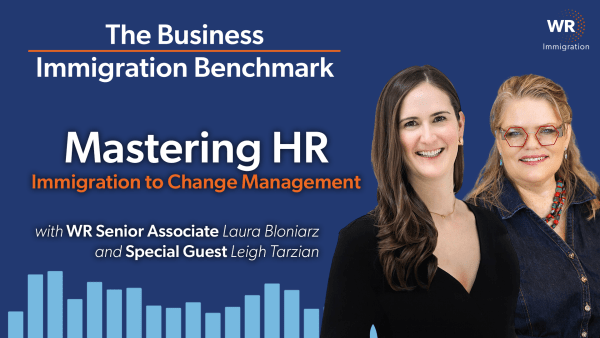Want to stay in the loop? Subscribe here to get the latest updates on the Business Immigration Benchmark podcast and more!
In this week’s episode of The Business Immigration Benchmark, I had the pleasure of speaking with J Leigh Tarzian, PHR, SHRM-SCP, an experienced HR generalist, about how HR teams support immigration programs while managing a broad range of responsibilities. Leigh shared her perspective on navigating complex HR challenges, leveraging networks, and ensuring compliance in today’s evolving workplace.
For global mobility professionals navigating uncertainty, this episode provides actionable insights into how technology, compliance, and change management are shaping industry priorities.
Key Takeaways:
1. The Role of an HR Generalist in Immigration:
Leigh emphasized that while HR generalists are not solely focused on immigration, they play a crucial role in managing cases, working with legal counsel, and ensuring compliance. The ability to ask thoughtful questions, connect with the right experts, and stay informed is key to success.
2. Balancing Priorities in a Fast-Paced HR Environment:
With HR covering everything from compliance to employee relations, Leigh shared how effective prioritization and clear communication help manage competing deadlines. She highlighted the importance of setting boundaries and using technology to stay organized.
3. Leveraging Networks for Problem-Solving:
Leigh’s involvement in professional organizations, such as SHRM and the HR Southwest Conference, has helped her build a strong network of experts. She emphasized the value of lifelong learning and seeking advice from trusted peers when navigating challenging HR and immigration issues.
4. Managing Change in Immigration Policies:
As immigration policies shift, HR teams must be prepared to adapt. Leigh discussed how she collaborates with legal counsel to understand new regulations and implement best practices, ensuring that employees remain compliant and informed.
My Parting Thoughts
HR generalists like Leigh play an essential role in global mobility, balancing numerous responsibilities while ensuring a seamless immigration process. Her insights remind us that staying informed, leveraging networks, and embracing change are key to success in today’s workplace.
If you have insights or strategies you’d like to share, feel free to DM me on LinkedIn or submit a question here!


